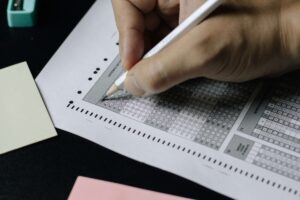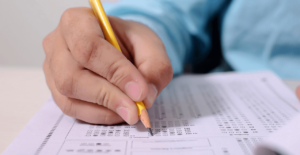
The organization of the 2020 Bar Exam has proved challenging. The Coronavirus Pandemic forced 60% of states to change their plans for July, with New York deciding in favor of an online bar exam. Now, many wonder: will the administration of the exam be as chaotic as its organization?

Casey Cheney studies for the upcoming Michigan bar exam. (Photo: Casey Cheney) Credit @DetroitFreePress
It has been difficult lately to follow the latest updates on the administration of the 2020 Bar Exam. Preparing for the bar is stressful and it is even more difficult during a pandemic. The truth is: we are in uncharted territory, everything is changing rapidly. See New York for instance: initially postponed until September 9-10, the exam was then cancelled and is now set to take place remotely on October 5-6.
What are other states doing?
In response to the coronavirus outbreak, states across the country have been revisiting their original plans to administer the bar exam in July 2020. A total of 23 states, including North Carolina, are going ahead with in-person bar exams.
At least 8 states require test-takers to sign waivers agreeing not to sue if they’re hospitalized from the disease. Other mitigating factors include limiting exam seating, requiring social distancing and mask use, and mandating that test-takers submit to temperature checks upon entry to testing sites.
Other states, such as New York, California, and Illinois, have moved the test online. However, two states already, Nevada and Indiana, have pushed back the dates for their online bar exams after users taking practice tests encountered technology problems.
Along with modifications to test dates and methods, many jurisdictions are creating or expanding existing opportunities for new law school graduates to engage in limited practice under attorney supervision while awaiting bar exam testing opportunities or results.
The option of diploma privilege is also on the table. Long allowed in Wisconsin, it has now been adopted in Utah, Washington, Oregon, and most recently Louisiana. Privilege advocates say the bar exam is outmoded and isn’t a fair test of legal competency anyway.
So, while the October online testing option may not be a perfect solution, we believe that it is a sound alternative that best serves everyone’s interests at this unprecedented time of extraordinary stress and uncertainty for the law school class of 2020.
NY Chief Judge Says Online Bar Exam Is 'Sound Alternative' Tweet
Michigan online bar exam temporarily taken down by ‘sophisticated’ cyberattack
Despite every effort, the online Michigan bar exam crashed, taken down by a “sophisticated” cyberattack, the vendor offering the online exam said Tuesday.
ExamSoft, one of the three vendors offering the exam that certifies potential attorneys, said the test had been hit by a distributed denial of service (DDoS) attack, which involves a hacker or group attempting to take down a server by overwhelming it with traffic.
“Each technology vendor has systems in place to help maintain the security of the remote exam and ensure a smooth testing experience for candidates,” the NCBE spokesperson said. “Jurisdictions that decide to administer the emergency remote exam will work with their selected vendor to address any security and technical issues that arise.”
A technical glitch with passwords for the Michigan Bar Exam has been resolved. Test takers are being emailed passwords and the test day will be extended to allow for the delay for some test takers to access the second module. ADA participants were not affected. #MIbarexam
— MI Supreme Court (@MISupremeCourt) July 28, 2020
So this is not so encouraging. Obviously, online exams are better than in-person exams, and there’s every reason to believe that the administration of the exam will be vastly improved by October. The problem is that the online exam has never been tested before, forcing applicants to act as unwitting beta testers during the most important examination of their lives. Quite chaotic.
Stressful in-person exam for more than 20 states
Many states appear to care less about the risk of spreading a potentially deadly virus than maintaining the integrity of their “process”. Rather than opt for an online exam or temporary diploma privilege, those states are giving test-takers the choice of postponing the exam to protect their health or assuming the risk and taking the exam.
In Arizona, where the state reported nearly 4,900 new COVID-19 cases and 88 virus-related deaths on July 1, according to the Arizona Republic, the supreme court recently announced plans to go forward with its in-person July UBE, as well as a remote exam in October, which will be limited to Arizona accreditation. Arizona bar applicants must submit a declaration, stating they have not tested positive for the virus or had symptoms, including coughing, fever and shortness of breath within 14 days of the exam.
Bar applicants in North Carolina, whose Bar Exam takes place this week, will need to wear masks. “We’re taking into account the airflow in the room and the possibility of someone sneezing,” adds Herrick, a guardianship and estate administration attorney based in Concord, North Carolina.
“We are still implementing the bar exam because we believe it is the best measure of minimum competency, and that’s the board’s mission,” explained the Missouri Board of Law Examiners. “We’re trying to do everything we can to make sure that we’ve created an environment that isn’t more stressful but is keeping everybody as safe as possible,” said Andrea Spillars, executive director of the board. Not sure how that will go.
Perhaps it is the time to move on?
We’ve heard from lots of people rightfully concerned about taking the Florida bar exam (while packed together with 1K+ people for two days) as new COVID cases continue to surge in our area—especially among young people.
— Rep. Carlos G Smith (@CarlosGSmith) June 23, 2020
Why are we doing this??? ? https://t.co/cQ97ZdIaRg
As exam dates continue to be pushed back, more and more exam takers will have to take nonlegal jobs just to survive. Given the challenges of taking and passing the bar exam while working, the sad truth is that many of these graduates may effectively lose the opportunity to practice entirely.
So perhaps this year could be an exception. States could decide for a diploma privilege where individuals seeking admission to the bar are granted licensure upon successful completion of law school requirements and graduation from law school.
Perhaps states can require that applicants complete a set number of supervised practice hours in a given time frame. Perhaps states can require applicants to complete additional Continuing Legal Education courses. If state Supreme Courts are truly concerned about protecting the public through licensing, they have the power to accomplish this goal through these or similar conditions.
In the end, the deadlock on the administration of the Bar Exam and the security risks linked to an online exam, appear to be a recipe for disaster.
Leave a Comment
Tag: Bar Exam Coronavirus 2020
Home » The Bar Exam During A Pandemic: A Recipe for Disaster?
MORE FROM THE INTERNATIONAL LAWYER
SUBSCRIBE NOW
Taking the Bar Exam?
-
Sale!
![Examen de l'article 100 - Fiches de révision [PACKAGE] (2025)](https://theinternationallawyer.org/wp-content/uploads/2022/10/Article-100-fiches-révision-1-300x457.png)
Examen de l’article 100 – Fiches de révision [PACKAGE] (2025)
Rated 5.00 out of 5$170.00Original price was: $170.00.$145.00Current price is: $145.00. Add to cart -
Sale!

Article 100 – Fiche de révision sur la Procédure Pénale (2025)
Rated 5.00 out of 5$29.99Original price was: $29.99.$23.99Current price is: $23.99. Add to cart
MORE FROM THE INTERNATIONAL LAWYER
Tag: Bar Exam Coronavirus 2020
SUBSCRIBE NOW
Sign up for our Newsletter
ABOUT US
A Legal Website - News, Insights and Opinions on Law School, the Bar Exam, and Careers for Law Students.
Contact us: [email protected]












